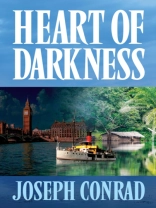Heart of Darkness
is a novella written in 1899 by Anglo-Polish novelist Joseph Conrad. It is about a voyage into the Congo Free State in the heart of Africa, by the story’s narrator Marlow, an introspective sailor who takes a job as a riverboat captain with the Company, a Belgian concern organized to trade in the Congo. Marlow, aboard a boat anchored on the River Thames in London, recounts to his friends the story of his assignment to journey up the Congo to retrieve and return Kurtz, an ivory hunter reputed to be an idealistic man of great abilities enjoying a reverenced effect on the natives, who delivers more ivory than all other stations combined. As Marlow travels to Africa and then up the Congo on the steamer ship, he encounters widespread inefficiency and brutality in the Company’s stations. The native inhabitants of the region have been forced into the Company’s service, and suffer terribly from overwork and ill treatment at the hands of the Company’s agents. This setting provides the framework for Marlow’s story of his obsession with Kurtz, and enables Conrad to create a parallel between London and Africa as places of darkness. Central to the book is the idea that there is little difference between so-called civilized people and those described as savages. Conrad raises important questions about imperialism and racism. The cruelty and squalor of this imperial enterprise contrasts sharply with the majestic jungle that surrounds the white man’s settlements, making them appear to be tiny islands amidst a vast darkness. Heart of Darkness is a novella written in 1899 by Anglo-Polish novelist Joseph Conrad. It is about a voyage into the Congo Free State in the heart of Africa, by the story’s narrator Marlow, an introspective sailor who takes a job as a riverboat captain with the Company, a Belgian concern organized to trade in the Congo. Marlow, aboard a boat anchored on the River Thames in London, recounts to his friends the story of his assignment to journey up the Congo to retrieve and return Kurtz, an ivory hunter reputed to be an idealistic man of great abilities enjoying a reverenced effect on the natives, who delivers more ivory than all other stations combined. As Marlow travels to Africa and then up the Congo on the steamer ship, he encounters widespread inefficiency and brutality in the Company’s stations. The native inhabitants of the region have been forced into the Company’s service, and suffer terribly from overwork and ill treatment at the hands of the Company’s agents. This setting provides the framework for Marlow’s story of his obsession with Kurtz, and enables Conrad to create a parallel between London and Africa as places of darkness. Central to the book is the idea that there is little difference between so-called civilized people and those described as savages. Conrad raises important questions about imperialism and racism. The cruelty and squalor of this imperial enterprise contrasts sharply with the majestic jungle that surrounds the white man’s settlements, making them appear to be tiny islands amidst a vast darkness.
A propos de l’auteur
Joseph Conrad was a Polish-British writer regarded as one of the greatest novelists to write in the English language. Though he did not speak English fluently until his twenties, he was a master prose stylist who brought a non-English sensibility into English literature.












